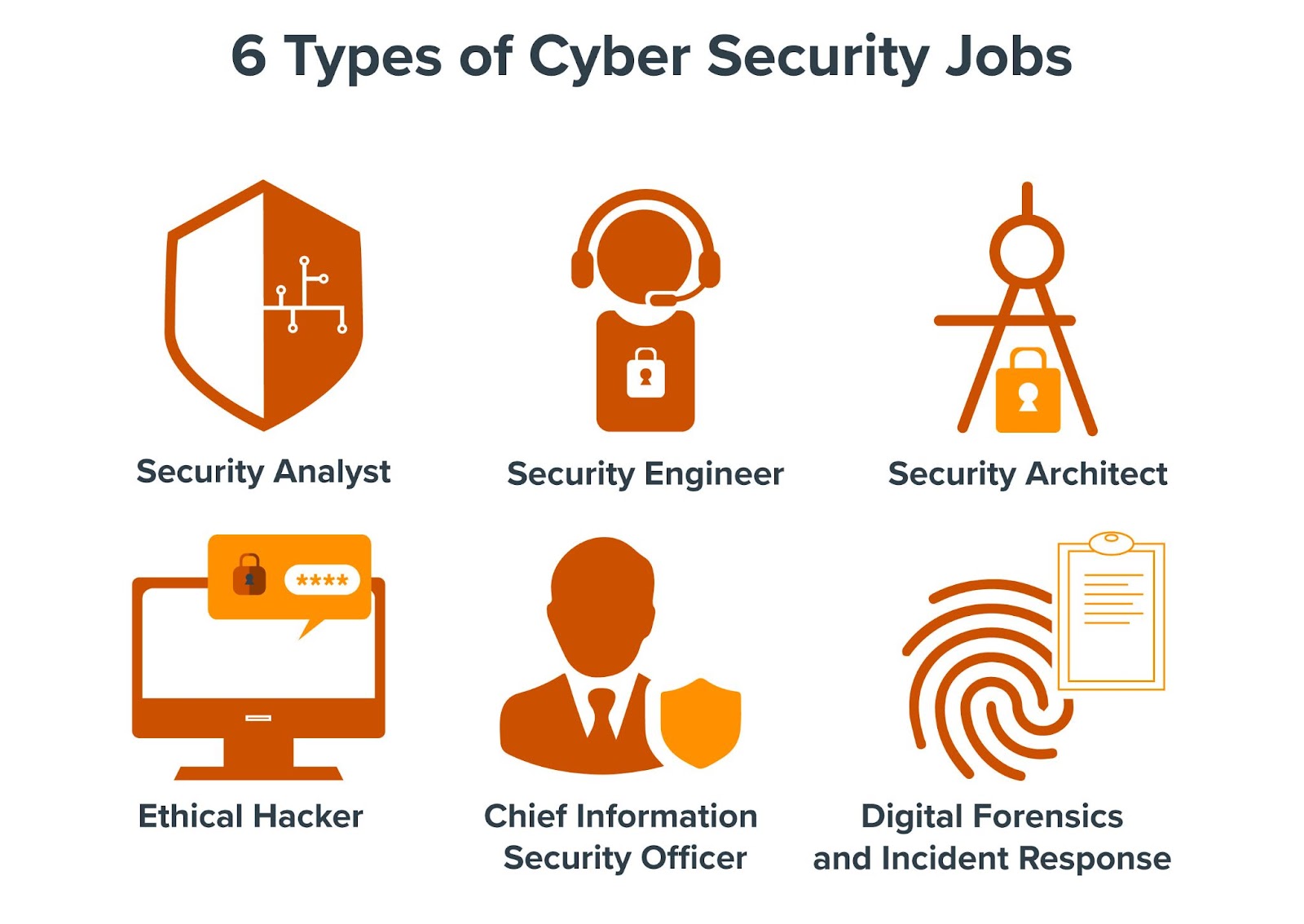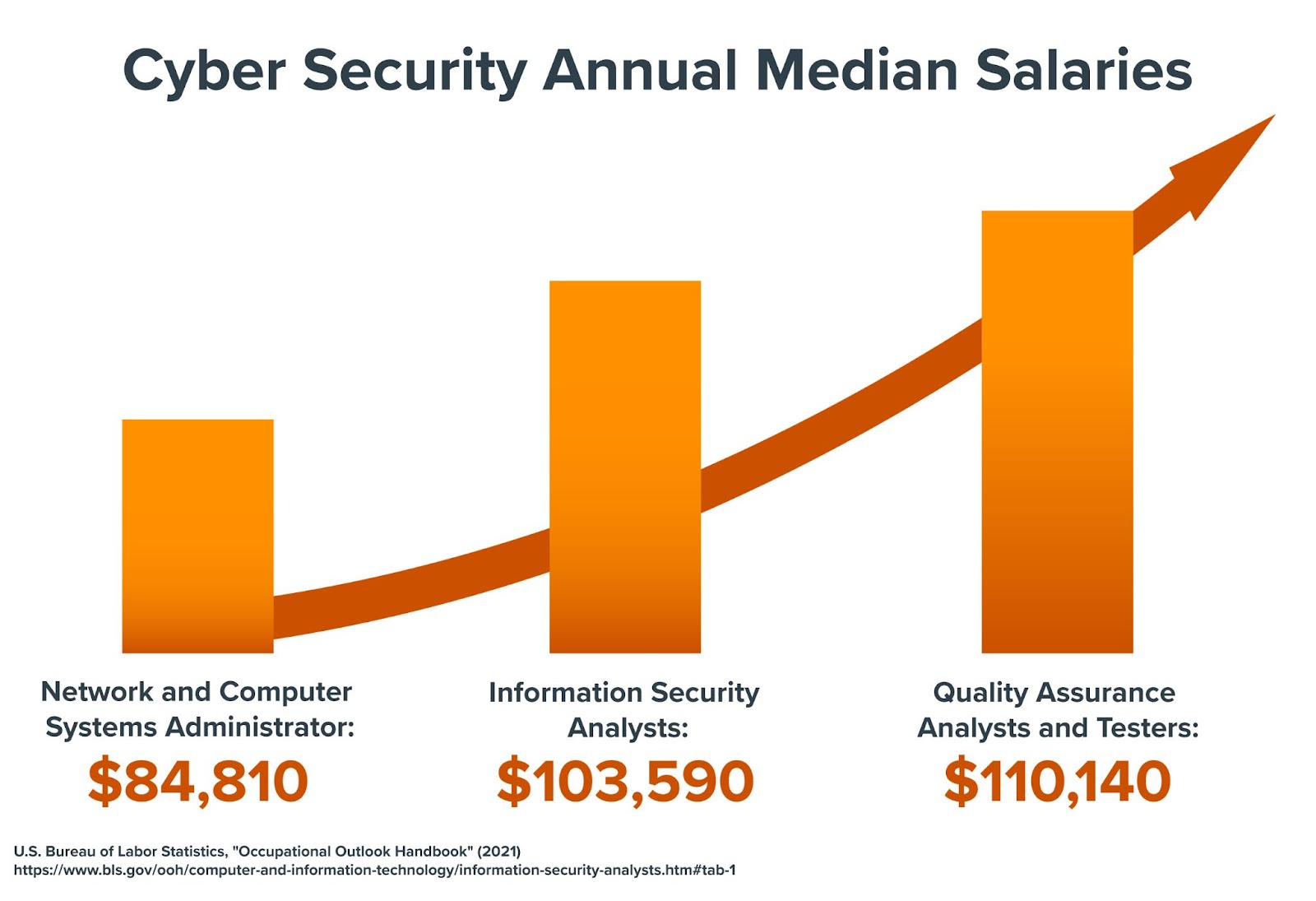Explore Career Paths: Security Analyst | Security Engineer | Security Architect | Ethical Hacker | Chief Information Security Officer | Digital Forensics and Incident Responder
The Cyber Security Career Path | 6 Jobs to Consider in 2023

Explore Resources: Requirements | Job Outlook | Salary
Starting a career in cyber security means entering a fast-growing field with a variety of employment prospects. With large cyberattacks occurring more frequently, many organizations are staffing up to defend against these threats.
There are many career paths available to those interested in becoming a cyber security professional, and taking the time to understand your options can help you figure out what is right for you. The best fit for you will depend on your specific interests, skill set, and goals for the future.
There are many excellent opportunities for those with relevant cyber security or technology-focused experience. If you don’t have existing expertise, a career in the industry is attainable — there are still ways to get into the field even if you haven’t worked in cyber security before. One way to gain the experience is through a cyber security bootcamp, which is an online, part-time course that teaches the fundamentals of cyber security.
Are you new to cyber security and want to learn more? Our beginner’s guide to cyber security has all of the information you need to get started. Now, let’s dive deeper into six different cyber security career paths open to individuals with the right skills.
Cyber Security Career Path 1: Security Analyst
Security analysts plan and carry out cyber security procedures to protect a company’s information and computer systems. This can involve monitoring a network for security breaches, installing and patching security software, conducting penetration testing to ensure systems are working, and other security-related tasks — as listed by the U.S. Bureau of Labor Statistics (BLS).
Security analyst roles are typically more entry-level, according to the BLS, and they generally provide a good onboarding pathway to a career in cyber security. Many cyber security analysts study a related field in a four-year university, like computer science, information technology, or engineering; while others use transferable skills built up through a career in information technology, computer engineering, or other tech-focused fields. Another great option is a cyber security bootcamp — like The Cybersecurity Boot Camp at UT Austin — which typically allow students to learn cyber security online in as little as 24 weeks.
Working as a cyber security analyst is a promising starting point for any cyber security career, where you’ll be able to gain the skills needed to advance into more senior positions. Cyber security analysts will gain a deep knowledge of computer systems, security procedures, information technology, and best practices in the cyber security field.
There are many subfields for security analysts to pursue. For example, many modern organizations avoid hosting their server infrastructure on-site, instead choosing to use a service like Amazon Web Services or Microsoft Azure for cloud hosting or services. Organizations that use AWS or Azure may need cloud-specific security analysts to ensure the security of data hosted on the cloud.
Cyber Security Career Path 2: Security Engineer
Cyber security engineers identify threats and vulnerabilities in computer systems and develop defenses against those threats. Sometimes, cyber security engineers work with other cyber security team members to identify and patch vulnerabilities. For example, a cyber security analyst might uncover an issue in a company’s firewall — a system that monitors incoming and outgoing network traffic to flag and prevent threats. Actually developing and applying a fix for the issue would be the responsibility of a security engineer.
Patching vulnerabilities requires a broad understanding of the computer and network systems at play. Fixes must be deployed in a way that removes the vulnerability without breaking other functionality.
Often, cyber security engineers have a deep understanding of cyber security and computer skills, including software development, cyber security, network administration, and information technology administration. Security engineer positions typically require some previous experience in either cyber security or software engineering, though cyber security experience is preferred.
Cyber Security Career Path 3: Security Architect
Security architects, also known as cyber security architects, are senior-level professionals tasked with designing and implementing an organization’s computer and network security infrastructure. This role typically requires specialized cyber security work experience and can be a stepping stone for high-performing security analysts or system administrators.
Security architects are typically responsible for supervising a broader security team, including security analysts, security engineers, and more. Often, security architects are in charge of interfacing with executive-level management to ensure that the organization can defend against external attacks.
Security architects can plan, research, and design security solutions; prepare budgets and cost estimates for cyber security initiatives; and provide technical supervision to an organization’s security team. It’s vital for security architects to stay up to date with the latest best practices and trends in the security industry, so many architects complete ongoing training or certifications to keep their skills sharp.
Cyber Security Career Path 4: Ethical Hacker
If you spend enough time learning about cyber security, you’ll eventually encounter the terms “black hat” and “white hat” hackers. These terms can be traced back through history, but their relevance in cinema often helps people remember the differences between the two. Popular old movies set in the American West often featured a specific piece of imagery — the “bad guys” wore black cowboy hats, while the “good guys” wore white cowboy hats. This imagery has stuck around in the cyber security field today to describe hackers and their motivations.
“Black hat” hackers have malicious intent, breaking into computer systems for personal or financial gain. They often target sensitive information like credit card numbers, account information, or personally identifiable information. In contrast, ethical hackers are referred to as “white hat” hackers, using their knowledge of hacking and exploiting vulnerabilities in computer systems to uncover and fix security issues for organizations. White hat hackers might attempt to break into a computer system or network, exposing vulnerabilities that the system’s administrators can then fix.
One area where an ethical hacker might work is penetration testing. Penetration testing is a simulated cyberattack used to spot and fix potential vulnerabilities. This can be done either in-person or online, and allows an organization to see what a cyberattack might look like so they can prepare themselves against potential attacks. Some penetration testers even complete field tests to attempt to break into an organization’s infrastructure using in-person social engineering techniques or other black-hat techniques.
Cyber Security Career Path 5: Chief Information Security Officer
Chief Information Security Officers, also known as CISOs, are senior-level executives that focus on cyber security efforts at the organizational level. The CISO is often the highest-level cyber security position at a company, and they set the direction of cyber security initiatives and programs for an organization.
CISOs work alongside other executives like the Chief Financial Officer (CFO) and Chief Executive Officer (CEO) to monitor and maintain the security of an organization’s computer and information infrastructure. They’re in charge of creating company or enterprise-wide security measures and policies, setting the stage for other employees to execute on the specifics of a plan. They might also create and conduct employee security awareness training, develop secure business practices, and purchase security software or products from external vendors. The CISO has the final say on security-related subjects for an organization.
The Chief Information Security Officer is responsible for high-level security measures and plans. They must understand the current security landscape and the future of cyber security threats to set the organization up for success. Becoming a Chief Information Security Officer typically involves a great deal of previous cyber security experience — sometimes more than 10 years if working at a large enterprise.
Cyber Security Career Path 6: Digital Forensics and Incident Responder
Up until now, we’ve mostly discussed career paths that focus on preventing cyber attacks. However, the reality is that even organizations with the most robust cyber security measures in place can still be subject to cyberattacks. Once a cyberattack occurs, there is still more work to be done — this is where the field of digital forensics comes into play.
Digital forensics is a field within computer science that investigates digital evidence. It’s a component of investigating cybercrimes, and it involves acquiring, analyzing, and preserving data that can be used as evidence for police or in a courtroom. Digital forensic experts can investigate a cybercrime after it occurs, acquiring evidence and attempting to connect the attack to a specific individual or group of hackers. Digital forensics experts work across many law enforcement agencies, including the FBI. Digital forensics roles can involve working with many different organizations on various cyber security topics.
Digital forensics also plays an essential role in preventing future attacks. Discoveries from the forensic process can highlight vulnerabilities and help cyber security professionals prevent future security breaches. Collecting evidence and relaying findings back to an organization can help an organization improve its defenses against future attacks.
Having previous experience in tech-focused fields like systems administration or programming can help you get started in digital forensics. The field is considered to be interesting to work in given that no two projects will be the same, and the evidence-gathering process is comparable to in-person detective work. Working in digital forensics or cybercrime and incident response can be an excellent fit for tech-savvy employees interested in government or law enforcement work.

How to Get Into a Cyber Security Career Path
Cyber security is a newer field, as the need for security specialists has increased in the last few decades as the digital revolution has impacted just about every industry. As a result, there isn’t a large enough supply of cyber security professionals to fill every open job posting. For those who are new to the field or just getting started, now is a great time to forge a path as a cyber security professional. Transferring to cyber security from a tech-related field will be easiest, but other options are available for anyone with proper motivation.
Some professionals start in cyber security by applying relevant skills learned in a different field. Working in software development, information technology, or systems administration can give you enough transferable skills to start in an entry-level cyber security role. You can use this as a starting point for higher level positions later on down the line.
If you don’t have previous cyber security or technology experience, there are other ways to get started in the field. One option is to complete a traditional four-year undergraduate degree. Some schools offer a degree in cyber security — or a degree in computer science with a cyber security concentration. Completing a traditional degree program can allow you to explore many subjects over a long period, and is an excellent opportunity for students coming out of high school or anyone interested in a formal educational route into cyber security.
You can also pick up new cyber security skills by completing a cyber security bootcamp. Finishing a bootcamp can help you learn new skills in a flexible, online environment — allowing you to study without interrupting your existing responsibilities. The Cybersecurity Boot Camp at UT Austin can teach you the skills required to start a cyber security career. Topics covered include networking, Windows and Linux administration techniques, ethical hacking techniques, cyber security basics, and much more.
Interested in becoming a cybersecurity expert? The Cybersecurity Boot Camp at UT Austin can help you gain the in-demand skills to dive into the field and start an exciting new career.
Get Program Info
Cyber Security Requirements
Cyber security is a dynamic field that requires a mix of hard and soft skills to ensure long-term success. Here are some of the skills that are most important for cyber security professionals:
Cyber security professionals must have a strong understanding of computer systems and network systems. Understanding how to operate and maintain these systems and how they work is critical for professionals to protect them from intruders. Important topics include computer operating systems, software design and development, information technology, and networking.
Defending against cyber threats requires understanding the avenues available for hackers. Knowing the vulnerabilities of a system can help a cyber security professional better defend those vulnerabilities.
Understanding how to communicate effectively is critical for cyber security professionals. Cyber security professionals often work with their managers, other teams of technology professionals, or even executive leadership. Presentation skills can help communicate about budgets, plans, and security protocols. Keep in mind that cyber security professionals often work with non-technical teams, so being able to communicate complex information in a simple format is critical to the role.
Cyber security is often described as an “arms race” — organizations are continuously fortifying their defenses while hackers and other criminals are always searching for new attack vectors. Cyber security professionals must stay up on best practices, common threats, and the direction of an industry as a whole, making the field a great fit for anyone who loves learning.
Cyber security professionals must be able to keep up to date with trends in the industry, ensuring they can defend against modern threats. Completing crucial cyber security certifications like CompTIA Security+, Network+, Cloud+, or Certified Ethical Hacker (CEH) can show employers that you have the credentials to work as a cyber security expert.
Some higher level cyber security jobs might require a few years of applicable cyber security experience. Still, cyber security is a field where transferable technology skills can help you land an entry-level position due to the strong demand for cyber security professionals across all industries.
Cyber Security Job Outlooks
Job prospects for anyone working in the field of cyber security are incredibly strong, and the field is expected to grow incredibly quickly over the coming years. For example, according to the BLS, demand for Information Security Analysts is expected to grow by 33 percent by 2030. This growth is significantly faster than average, meaning that job prospects for the field are likely to stay strong for years to come. The demand for cyber security professionals has increased in recent years and is expected to remain high.
Modern cybercrimes are incredibly complex and can represent significant financial damages or lead to large data breaches, contributing to the rapid growth of the cyber security field. The consequences for an organization impacted by a cyberattack are severe, leading many organizations to increase the size of their cyber security team, or create a team if they didn’t have one in place. Because of this, the job outlook for cyber security professionals is expected to stay strong for a long time.
Cyber Security Job Salary
Salary prospects for cyber security and other tech-focused positions are incredibly strong. According to the BLS, the annual median salary for Information security analysts was $103,590 in 2020, significantly higher than the national average wage. Other similar fields have similarly high wages; for example, quality assurance analysts and testers reported a median annual salary of $110,140 in 2020, while network and computer systems administrators made $84,810. Cyber security professionals have very specialized skill sets, and their roles are very important to the functioning of an organization. As such, compensation is high in this field.

Is Cyber Security a Good Career? Begin Your Cyber Security Career Path Today!
Overall, the cyber security field provides excellent opportunities for nearly anyone with the right skill set. With many job openings and expected growth in the coming years, now is the time to get started in the field — even if you don’t have previous experience.
A cyber security bootcamp is a great starting point for anyone wanting to pick up cyber security knowledge. You’ll learn market-driven skills and work with skilled instructors to gain real-world experience. Whether you’re looking for a new career path entirely or wanting to upskill and take on new challenges in your current role, a bootcamp can be a great option in furthering your career.

 Live Chat
Live Chat